Raising ducks is very interesting and enjoyable. You can also think about raising some ducks on your farm or backyard with other poultry birds or farm animals. Ducks are also awesome as companion pets.
Some people love to keep some chickens, on the other hand some people love to keep the mild-mannered ducks on their own backyard for some fresh eggs and quality meat production.
On an average, ducks are usually raised for their meat and egg production. There are numerous duck breeds available throughout the world. You can easily choose any breed depending on your area and according to the available duck farming facilities in your area.
Here we are describing more about how to raise ducks and always keep the flock happy, healthy and productive.
How to Raise Ducks?
Raising ducks is very easy and they don’t require too much. They will live and produce happily as long as you provide them good shelter and quality feeds.
For keeping a healthy duck flock, you have to maintain and go through some step by step process. Follow the duck raising steps very carefully.
Choose Breeds
Before choosing best breed for you, consider your reasons for raising ducks. You can raise ducks for fresh eggs, quality meat and just as pets. After determining your purpose, look for the desired breed in your area.
Usually Indian Runner and Khaki Campbell ducks are considered as the best egg laying duck breeds. Aylesbury, Muscovy and Pekin are some popular meat duck breeds. For raising ducks as pets, you can choose any breeds.
But for raising ducks as pets, most people consider the nature and beauty of the duck breeds. If you want to raise ducks for only egg production, then consider purchasing only female ducks.
Because male ducks are pretty aggressive in nature and they might fight with the females. If you want to hatch eggs, then keep one male duck with every six to nine girls.
For raising ducks as pets and for meat production purpose, the ratio of male and female ducks can be any.
Housing
Good housing or shelter is not only important for ducks, but also very important for every farm animals. So try to ensure good housing facilities for your ducks.
A good duck housing system will keep your lovely birds safe from predators as well as from adverse weather conditions and harmful elements.
Ducks need shade from the sun, good ventilation system during summer season and insulation during winter. Try to make their house on a higher ground rather than in flood-prone areas.
Add proper lighting system and a heat lamp inside their house. This will add extra warmth for them during cooler weather, and also encourage them for laying more eggs (as presence of light influence egg production highly).
Usually ducks don’t require too much room space for themselves. Allowing them 2 to 3 square feet of floor space per duck will be sufficient enough. Keep nesting boxes for laying ducks inside the house. Setup a lockable door with their house.
This will give you access to clean the house and collect eggs while keeping the predators out. You can make the litter on the floor by using dry absorbent materials (such as wood shavings or straw).
If you use soiled bedding, then clean the litter frequently and add additional dry litter. In a word, make the house comfortable enough for your ducks.
Food & Water
Keep adequate number of feeders and waterers for your ducks so that they can eat sufficient amount of food and drink water according to their demand.
Keep 16 percent protein in the feed of adult ducks, add 2 percent calcium for breeder ducks. And 18 percent protein is suggested for the meat ducks.
You can give fruits and vegetables to your ducks. In case of providing them fruits or vegetables, chop it finely. Ducks usually forage for bugs, so they also work as pest controller.
If you don’t allow your ducks outside, then supplement their diet with grit. As the ducks are toothless bird, so they require grit for grinding the consumed food.
Always try to provide them sufficient amount of clean and fresh drinking water according to their demand and replace it daily. Ducks usually love to take bathe. So if possible, make a water source for them to bathe.
You can use small sized pond or children’s pool for making bathing facilities for your ducks. Ducks require water and bathing for cleaning their bills and eyes.
Breeding
You will need additional items for breeding purposes. You have to keep a brooder indoor, keep the brooder free from drafts and keep an adjustable heat management system to keep the ducklings warm.
Keep the brooder temperature 85° Fahrenheit for the first time and decrease it at the rate of 5° each week until reaching 70° Fahrenheit. Provide the ducklings with starter feed till they reach 2 weeks of age.
After that they will need 18 percent protein enriched food. At the age of 5 weeks switch to 16 percent protein.
You can allow the ducklings to outside by their age of 3 weeks. After 3 weeks, you can introduce the ducklings with other older ducks in your flock.
If any problems arise while keeping the ducklings with the older ducks, then keep the ducklings separate from the adults for a few days or weeks.
Health Care
Always try to take good care of your ducks. Look over their health on a regular basis to keep them free from all types of duck diseases. Look over the feather condition and ensure that the feathers are in clean condition.
Both the nostrils on their bills and their eyes should be clear of dirt and debris.
Ducks are more resistant to diseases than chickens and any other poultry birds. Pay extra attention to the smooth webbed feet which can easily become injured from rough surfaces.
Vaccinate your ducks for fowl cholera and avian flu. Both of these are dangerous to humans, so be very careful and never delay to vaccinate your ducks for these diseases. Keep good relation with the vet in your area and call him/her in case of an emergency.
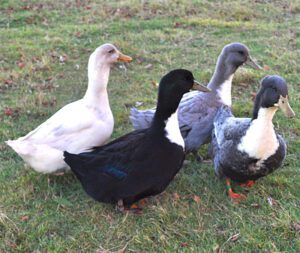
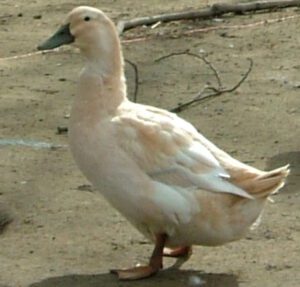
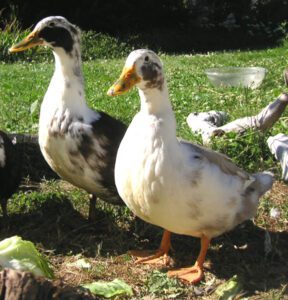
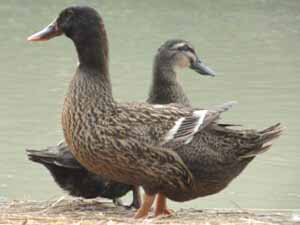
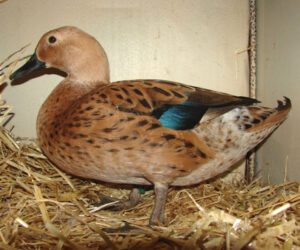

I have learnt much about the duck as i want to start keeping them in near future in my backyard. Do ducks climb or sleep on floor?
Regards
Yes ducks can sleep on floor but they can’t climb. Good luck!